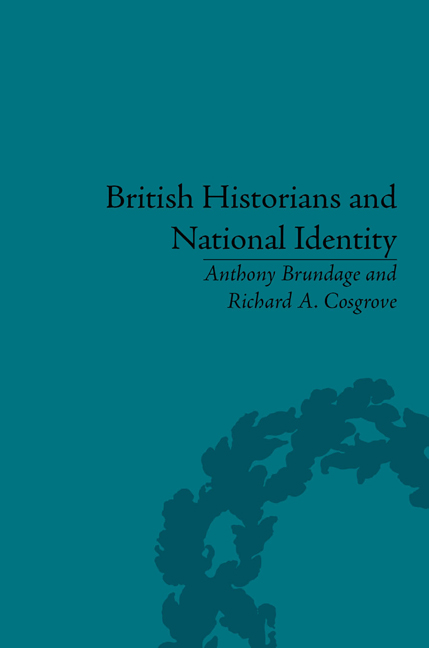Book contents
- Frontmatter
- CONTENTS
- Dedication
- Acknowledgements
- Introduction
- 1 Demythologizing the Nation's Past: David Hume's History of England
- 2 Catharine Macaulay's Vindication of Radicalism and the Republican Tradition
- 3 Reassessing Religion and the National Narrative: John Lingard and the English Reformation
- 4 Placing the Constitution at the Heart of National Identity: Henry Hallam and Constitutional History
- 5 Thomas Babington Macaulay: Writing the History of a Progressive People
- 6 The Glories of the Reformation and the Origins of Empire: J. A. Froude's Celebration of the Tudor Era
- 7 Edward Augustus Freeman: Liberal Democracy and National Identity
- 8 William Stubbs: The Continuity of English History as National Identity
- 9 Celebrating the People: J. R. Green's Short History
- 10 Samuel Rawson Gardiner: Incorporating Dissent into the National Story
- 11 In Thrall to English Tradition and Character: G. M. Trevelyan's Panoramic Histories of the Island Race
- 12 The Anglosphere as Global Model: Winston Churchill's History of the English-Speaking Peoples
- Conclusion
- Notes
- Works Cited
- Index
8 - William Stubbs: The Continuity of English History as National Identity
- Frontmatter
- CONTENTS
- Dedication
- Acknowledgements
- Introduction
- 1 Demythologizing the Nation's Past: David Hume's History of England
- 2 Catharine Macaulay's Vindication of Radicalism and the Republican Tradition
- 3 Reassessing Religion and the National Narrative: John Lingard and the English Reformation
- 4 Placing the Constitution at the Heart of National Identity: Henry Hallam and Constitutional History
- 5 Thomas Babington Macaulay: Writing the History of a Progressive People
- 6 The Glories of the Reformation and the Origins of Empire: J. A. Froude's Celebration of the Tudor Era
- 7 Edward Augustus Freeman: Liberal Democracy and National Identity
- 8 William Stubbs: The Continuity of English History as National Identity
- 9 Celebrating the People: J. R. Green's Short History
- 10 Samuel Rawson Gardiner: Incorporating Dissent into the National Story
- 11 In Thrall to English Tradition and Character: G. M. Trevelyan's Panoramic Histories of the Island Race
- 12 The Anglosphere as Global Model: Winston Churchill's History of the English-Speaking Peoples
- Conclusion
- Notes
- Works Cited
- Index
Summary
William Stubbs (1825–1901) enjoyed success in several careers, any one of which would have made him a model cleric or scholar. As an Anglican clergyman he eventually became Bishop of Chester and later Bishop of Oxford. Between 1864 and 1889, as an editor Stubbs contributed nearly twenty titles to the Rolls Series, an enterprise inaugurated in 1857 to publish manuscripts that illuminated the country's medieval history. Stubbs provided introductions to these volumes that were themselves significant essays. It was as historian that Stubbs gained his place among the luminaries of Victorian historiography, for his Constitutional History attained a fame and influence that even now has not entirely vanished. The great legal historian Frederic Maitland declared that he had read the three volumes at a club in London ‘because it was interesting’. Although Maitland travelled a different scholarly path, his opinion, considering the intellectual stature he attained, has remained perhaps the greatest compliment that Stubbs ever received. From its initial edition the Constitutional History acquired a prominence that spread well beyond the confines of academe.
John Burrow wrote of Stubbs's History that it was ‘one of the great books, in fact, of the nineteenth century’, a judgement with which we agree without reservation. His work rescued the study of medieval history from the blinkered conclusions of antiquarians and placed its study on a firm erudite basis:
- Type
- Chapter
- Information
- British Historians and National IdentityFrom Hume to Churchill, pp. 109 - 124Publisher: Pickering & ChattoFirst published in: 2014



